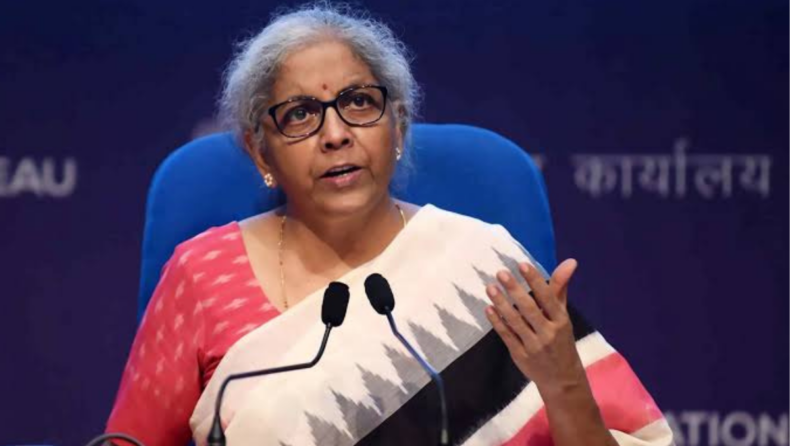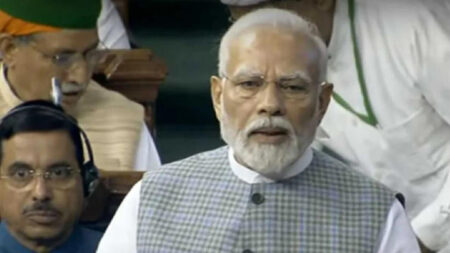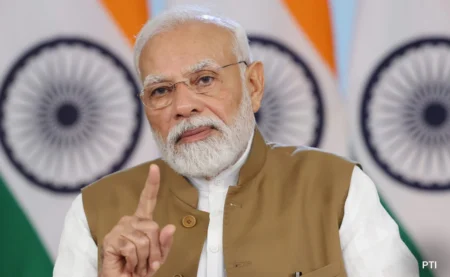Nirmala Sitharaman’s comments coincided with a heated national discussion over assistance programmes for the underprivileged and freebies to win over voters.

HIGHLIGHTS
- Finance minister Nirmala Sitharaman acclaimed the government’s growth strategy focuses on empowering the poor.
- she targets the former government by highlighting that ‘garbi hatao’ was just a slogan before the Modi government
The Narendra Modi administration’s development strategy is focused on “empowerment through saturation” to make sure that everyone receives the advantages of thoughtfully designed programmes to help them become independent, finance minister Nirmala Sitharaman said on Saturday.
“Every Indian citizen deserves to have unrestricted access to the necessities of life. She made the statement at the release of the 100th edition of the Economic Newsletter of the Bharatiya Janata Party (BJP) in Karnataka. “Our approach is one of empowerment through saturation of existing schemes rather than that of entitlement,” she said.
Nirmala Sitharaman’s remarks came amid a raging debate in the nation on freebies to woo voters and welfare schemes for empowering the poor. Following Prime Minister Modi’s comments on “revdi” culture last month, there has been political scuffle between the BJP and Aam Aadmi Party.
The finance minister defines the term “saturation” as successful implementation of welfare programmes, which was lacking before to the election of the Modi government in 2014.
“Why do I begin by discussing saturation? As a result of the several governments that have claimed to “garibi hatao” (eradicate poverty) in this nation during the past 75 years, money ought to be available to everyone… There have been numerous initiatives to (uplift) the poor… give them drinking water… Provide them houses,” she said.
All these existed. All these 75 years. What distinguishes 2014 from both now and all those earlier years? The difference is that we reach saturation in each of these situations under Prime Minister Modi’s leadership, Sitharaman said, adding that everyone could feel the difference between the former and current iterations of “garibi hatao.”
The United Nations Development Programme (UNDP) released a report on poverty last month predicted that barring India, 71 million people in the developing world—outside of India—would experience hardship due to the spillover effects of the war in Ukraine and rising prices on a worldwide scale.
According to the survey, targeted help to the underprivileged is effective in nations like India, as HT reported on July 13.
Nirmala Sitharaman asserted that the “entitlement attitude” of the past and the “empowerment principle” of the current administration represent the fundamental differences in approaches.
She used the Pradhan Mantri Jan Dhan Yojana, a financial inclusion programme launched by the Modi government, as an illustration. Through this programme, millions of people were able to open bank accounts and link them to their Aadhaar cards, building a robust telecom infrastructure that allowed them to access all services via their mobile phones.
The integrated and well-executed methodology (Pradhan Mantri Jan Dhan Yojana) paved the ground for the direct payment of subsidies to qualified recipients without any leakage, Sitharaman said.
The finance minister added that the Modi administration had to deal with a number of legacy issues, one of which was resolving banks’ concealed non-performing assets (NPAs).
She added that the government invested 3.36 lakh crore to revive public sector banks, saying that the government made courageous steps in this respect and that institutions are now operating successfully.
She said, “We make sure that individuals who have defrauded the banks and fled are rigorously pursued, their homes are auctioned, and the money is returned to the banks.
“That is always taking place, and it is a very important concept to never let go of those who have defrauded the banks of the nation. We have made sure that we are recovering the funds, and that process is ongoing, she continued.
After the Aam Aadmi Party (AAP) claimed that the government had forgiven Modi’s “friends” loans totaling 10 lakh crore, Sitharaman made the remark.
On Saturday, Manish Sisodia, the deputy chief minister of Delhi, charged that Modi’s “dostvaad” had “totally destroyed” the nation’s economy and pressed him to explain why his “friends” received tax breaks and had millions of dollars’ worth of debts forgiven.
There is a distinction between a write-off and a waiver, according to a finance ministry official who declined to be identified. Waivers are not write-offs. According to the central bank, write-offs are necessary only on a technical level; beyond that, the recovery process continues.
A suit has been filed against 12,076, or 98.5%, of the 12,265 designated wilful defaulters as of March 31, 2022, according to data from the Reserve Bank of India (RBI), while FIRs have been filed against 40.2% of those individuals.
According to the official, banks have recovered more than 8.60 lakh crore in bad loans over the past eight years.
Read More – No extension on GST compensation for states says finance minister Nirmala Sitharaman













